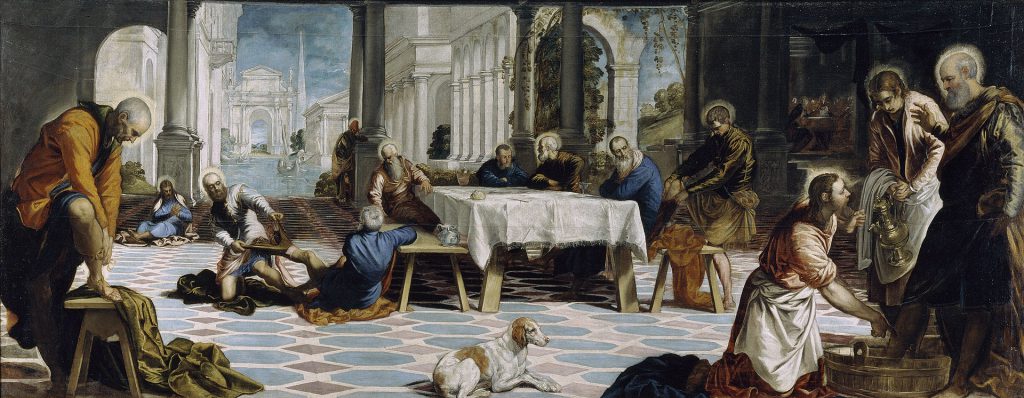We all know the scene: the Last Supper (you’re probably familiar with Da Vinci’s portrayal), where Jesus is joined by his disciples before ascending Calvary and all the sacrificial torment that is wrapped within that act. Holy Thursday celebrates the Lamb’s Supper, and today’s Gospel reading (John 13:1-15) once again reveals the love that Christ has for all of us. “He loved his own in the world and he loved them to the end.” What we read is one of the most beautiful acts of humility and service that this world has ever seen:
During supper,
fully aware that the Father had put everything into his power
and that he had come from God and was returning to God,
he rose from supper and took off his outer garments.
He took a towel and tied it around his waist.
Then he poured water into a basin
and began to wash the disciples’ feet
and dry them with the towel around his waist.
Jesus, the Son of God, displays for us what our lives are meant to look like. “For even the Son of Man did not come to be served, but to serve, and to give His life a ransom for many” (Mark 10:45). How often do we look for what we can get out of situations and relationships—even our relationship with God Himself!? I know I have and I do, sometimes taking on the attitude of, “What’s in this for me?”
This is what love really looks like. During the Holy Thursday Mass we often witness the priest wash the feet of his parishioners. Pope Francis will be washing the feet of migrants this year, as he has similarly washed the feet of inmates and disabled persons over the past few years. Recently, I have seen this act take place at wedding receptions, where they groom will wash the feet of his bride (and sometimes vice-versa), signifying his devoted service to her through their marriage. It requires humility on the part of the one getting their feet washed, and a remarkable outward expression of humility and love on the behalf of the one who is doing the feet washing.
The process of recovery works parallel to this type of service. It was identified as the “service imperative” when I was first getting sober, and I was constantly reminded that long-term sobriety would not be possible without sharing the grace of God that was freely given to me. “Wash one another’s feet.” Bill Wilson, the founder of Alcoholics Anonymous, does not mix words when he stresses the importance of the addict/alcoholic “washing the feet” of others:
“My friend had emphasized the absolute necessity of demonstrating these principles in all my affairs. Particularly was it imperative to work with others as he had worked with me. Faith without works was dead, he said. And how appallingly true for the alcoholic! For if an alcoholic failed to perfect and enlarge his spiritual life through work and self-sacrifice for others, he would not survive the certain trials and low spots ahead. If he did not work, he would surely drink again, and if he drank, he would surely die. Then faith would be dead indeed.”[1]
Isn’t that the truth for all of us? Whether you identify as an addict or not, without acting upon the service imperative that Christ models at the Last Supper, we are doomed to a spiritual death! He does not mix his words either.
If I, therefore, the master and teacher, have washed your feet,
you ought to wash one another’s feet.
I have given you a model to follow,
so that as I have done for you, you should also do.
A gift is not truly a gift unless it can be given away. Faith is but an idea unless it models the behavior of our Savior. Sobriety is not fully attained it less it can be freely given to others.
How does your life model the washing of feet by our Lord before His death?
What are you doing to “perfect and enlarge your spiritual life through work and self-sacrifice for others”?
May God bless you abundantly on this Holy Thursday!
“No one has greater love than this, to lay down one’s life for one’s friends.”
-John 15:13
Photo Credit: Tintoretto
[1] Alcoholics Anonymous (“Big Book,” 4th ed.) (2001). New York: AA World Services, Inc.

